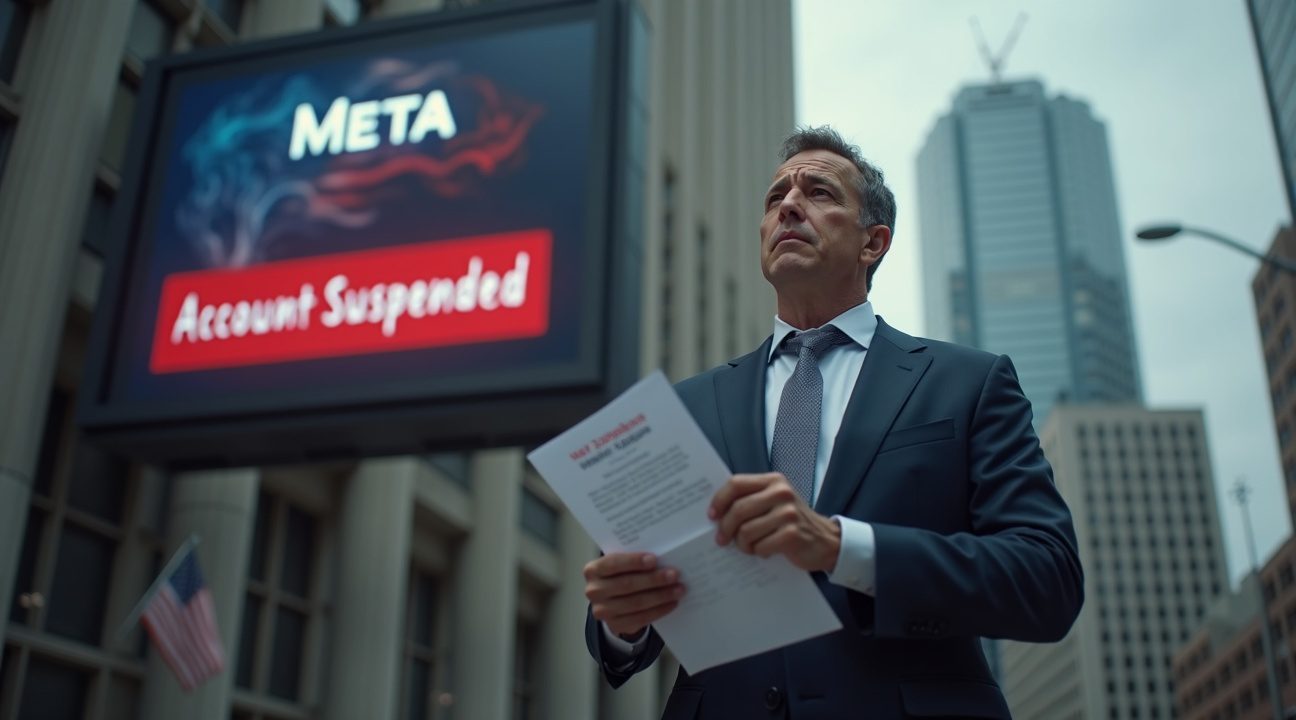Attorney Mark S. Zuckerberg of Indianapolis has taken legal action against Meta after enduring eight years of unjustified account suspensions triggered by the company’s automated systems, which repeatedly mistook him for Meta’s CEO, Mark Zuckerberg.
Background of the Lawsuit
Mark S. Zuckerberg, a seasoned bankruptcy attorney with nearly four decades of legal experience, faced persistent suspensions of his Meta accounts. According to the lawsuit, his accounts were erroneously flagged at least nine times by the platform’s automation, each time incorrectly identifying him as impersonating CEO Mark Elliot Zuckerberg.
Verification Attempts and Business Impact
Despite continuous attempts to verify his identity, all of which included professional documentation, Zuckerberg’s accounts were frequently deactivated. These suspensions disrupted his online presence and communication channels, which are crucial for client engagement in today’s legal field.
Key Takeaways
- Repeated account suspensions: Zuckerberg’s accounts were suspended at least nine times over an eight-year span by Meta’s automated moderation.
- Seeking damages: The attorney is requesting over $11,000 in advertising losses, along with compensation for business disruption and legal expenses.
- Long-term impact: Each suspension lasted from several weeks to as long as six months, significantly hindering client communications and online operations.
- Response from Meta: Meta restored the attorney’s account only after the media highlighted the lawsuit, though the company has yet to comment on potential reimbursement.
- Systemic challenges: The situation illustrates the flaws in content moderation systems, especially when dealing with legitimate users who happen to share names with high-profile figures.
Implications for Other Users
This case raises important questions about the reliability and fairness of automated moderation tools. It underscores the need for balanced systems that combine automation with human oversight—particularly for identity verification processes involving common or shared names.
Looking Ahead
The outcome of this legal action could influence future practices in digital identity verification and moderation protocols. It might also encourage platforms like Meta to review the growing concerns with algorithmic system flaws that inadvertently penalize legitimate users.
Bankruptcy Lawyer With Same Name as Meta CEO Files Lawsuit After Repeated Account Suspensions
I can only imagine the frustration experienced by Mark S. Zuckerberg, a bankruptcy attorney from Indianapolis who has practiced law for nearly four decades. His unfortunate predicament stems from sharing a name with one of the most recognizable tech executives in history. On September 2, 2025, this veteran lawyer filed a lawsuit against Meta in Marion Superior Court, marking what might be one of the most ironic legal battles in recent memory.
The legal filing reveals a pattern of systematic harassment by Meta’s automated systems that has persisted for eight years. Mark S. Zuckerberg’s accounts have been suspended at least nine times during this period—five suspensions affecting his business account and four targeting his personal profile. Each suspension occurred because Meta’s algorithms mistakenly identified him as an impersonator of CEO Mark Elliot Zuckerberg.
Repeated Identity Verification Failures
Despite multiple attempts to prove his legitimate identity, the bankruptcy lawyer found himself caught in a cycle of account suspensions and restoration requests. Meta’s systems consistently flagged his accounts as fraudulent, apparently unable to distinguish between two individuals who happen to share the same name. The attorney repeatedly submitted proof of identity through official channels, yet the automated systems continued their relentless targeting of his accounts.
The situation became particularly problematic for his professional practice, as many bankruptcy attorneys rely heavily on social media platforms to communicate with clients and maintain their professional presence. Each suspension disrupted his ability to conduct business and connect with potential clients who might need his legal services.
His lawsuit alleges negligence and breach of contract against Meta, arguing that the company failed to properly maintain his legitimate accounts despite repeated evidence of his authentic identity. The legal action highlights serious flaws in Meta’s account verification processes and raises questions about how the platform handles cases involving shared names with high-profile individuals.
The case presents a fascinating David versus Goliath scenario, where Mark Zuckerberg apologizes have become a familiar sight in tech news, but this time it’s the other way around. The Indianapolis attorney seeks damages for the ongoing interference with his professional and personal online presence.
This lawsuit also exposes broader issues with automated content moderation systems that major social media platforms employ. While these systems process millions of accounts daily, they struggle with nuanced situations like legitimate users who share names with celebrities or public figures. The bankruptcy lawyer’s case demonstrates how algorithmic decision-making can create persistent problems for ordinary users who fall outside typical parameters.
The timing of this legal action comes at a particularly interesting moment for Meta, as the company has faced increased scrutiny over its content moderation practices and user verification processes. The irony of the situation hasn’t been lost on legal observers—one Mark Zuckerberg suing another Mark Zuckerberg over account suspensions creates a narrative that seems almost too bizarre to be real.
For the Indianapolis attorney, this lawsuit represents more than just a personal grievance. His case could potentially set precedents for how social media platforms must handle identity verification and account restoration processes. The repeated nature of his suspensions suggests systematic failures rather than isolated incidents.
The legal filing seeks:
- Compensation for damages caused by the ongoing account suspensions
- Policy changes to improve Meta’s verification procedures
- Greater accountability in algorithmic decision-making
Whether this case will prompt meaningful reforms in how platforms handle shared names remains to be seen, but it certainly highlights the human cost of automated moderation systems that prioritize speed over accuracy.
This unprecedented situation demonstrates how even the most routine aspects of digital life can become complicated when algorithmic systems make assumptions about user identities. The bankruptcy lawyer’s persistence in fighting these suspensions through legal channels may ultimately benefit other users who find themselves similarly caught in automated moderation loops.

Attorney Seeks Over $11,000 in Damages Plus Account Restoration
The lawsuit demands substantial financial compensation from Meta, with attorney Mark Zuckerberg seeking reimbursement for lost business opportunities and more than $11,000 in advertising expenditures that became worthless due to account suspensions. His legal filing also requests full restoration of his suspended accounts and coverage of attorney’s fees incurred throughout this lengthy battle.
Account suspensions have plagued the lawyer for extended periods, ranging from several weeks to an astounding six months per incident. The most recent suspension locked his account for over four months, effectively crippling his ability to conduct business through the platform. These repeated disruptions have severely impacted his law practice’s digital marketing efforts and client outreach capabilities.
Identity Precedence and System Sophistication Claims
The attorney’s case centers on a fundamental argument about identity and timing. He contends that his name existed long before Facebook’s CEO rose to prominence, and Meta’s advanced technological systems should possess the capability to distinguish between individuals sharing the same name. This assertion challenges the company’s current name-verification protocols and suggests their algorithms lack necessary sophistication.
The ripple effects of Meta’s name-matching problems extend beyond the lawyer’s personal accounts. His sister’s homeowners association account also faced suspension, demonstrating how the platform’s automated systems can incorrectly flag related accounts based on name similarities alone. This collateral damage illustrates the broader implications of the company’s identification algorithms and their potential for widespread disruption.
I’ve observed similar cases where automated systems struggle with common names, but this situation presents unique circumstances given the identical names involved. The lawyer’s claims about his identity predating the CEO’s fame add an interesting legal dimension to what might otherwise be dismissed as a simple technical glitch.
The ongoing scrutiny of Meta’s practices makes this case particularly relevant for understanding how the company handles identity verification disputes. The substantial financial damages sought suggest this isn’t merely about account access but represents significant business losses accumulated over multiple suspension periods.
Meta’s response to these allegations will likely focus on their security protocols and the challenges of managing billions of accounts. However, the attorney’s case highlights potential flaws in automated systems that can’t adequately distinguish between legitimate users who happen to share names with high-profile individuals.
The lawsuit’s demand for attorney’s fees adds another layer of financial pressure on Meta, particularly if the court finds merit in the claims about inadequate system sophistication. This component could set precedent for other users facing similar automated suspension issues.
Account restoration forms a critical part of the requested relief, as the lawyer needs functional access to continue his business operations. The extended suspension periods have created a documented trail of business disruption that strengthens his compensation claims.
The case presents interesting questions about corporate responsibility for algorithmic decision-making and whether companies like Meta should be held liable when their automated systems cause business harm through false positives. The lawyer’s assertion about name precedence creates a unique legal framework that could influence how platforms handle identity verification going forward.
Business losses from suspended advertising campaigns represent quantifiable damages that courts can more easily assess compared to abstract claims about reputational harm. The specific $11,000 figure provides concrete evidence of financial impact from the suspended accounts.
The public attention surrounding Mark Zuckerberg as a figure makes this case particularly fascinating from both legal and public relations perspectives. The irony of someone with the same name suing the platform’s founder creates inherent media interest that could pressure Meta toward settlement.
Related account suspensions affecting the homeowners association demonstrate how Meta’s algorithms can create cascading effects that impact multiple parties. This expansion of harm beyond the primary account holder strengthens the case for systematic problems rather than isolated incidents.
Business Operations Severely Disrupted by Recurring Suspensions
The financial toll from Meta’s repeated account suspensions extends far beyond simple inconvenience for this practicing attorney. I’ve observed how the lawyer documented losing at least $11,000 in advertising spend to Meta without receiving any corresponding benefit, as his accounts faced suspension during active ad campaigns. This represents a significant financial blow for any legal practice, particularly when advertising budgets are carefully calculated to generate specific returns on investment.
The disruption goes deeper than monetary losses. Critical client communications became impossible when Meta locked his accounts, forcing him to scramble for alternative contact methods. Potential clients couldn’t reach him through his established social media channels, and ongoing cases suffered from communication gaps. Business opportunities vanished as his digital presence disappeared without warning, leaving prospects unable to connect with his services.
Comparing the Experience to Traditional Advertising Fraud
The attorney’s analogy perfectly captures the absurdity of his situation. He compared Meta’s actions to “buying a billboard on the side of the highway, paying the people for the billboard and then they come and put a giant blanket over it and you don’t get the benefit of what you paid for.” This comparison highlights how Meta collected payment for advertising services while simultaneously preventing those advertisements from running by suspending the accounts.
Traditional advertising contracts include specific performance guarantees and remedies for non-delivery. When a radio station fails to run purchased ads, they provide make-goods or refunds. Print publications offer similar protections. Meta’s platform, however, operates under terms that apparently allow them to collect payment while denying service, leaving advertisers with little recourse.
The repeated nature of these suspensions created a pattern of operational chaos. Each suspension required hours of effort to resolve, pulling the attorney away from billable client work. His marketing campaigns faced constant interruption, making it impossible to build consistent momentum or measure campaign effectiveness. Professional reputation suffered as clients and colleagues witnessed his social media presence vanishing repeatedly without explanation.
The broader implications affect how legal professionals can rely on digital platforms for business development. When Zuckerberg apologizes for platform issues, individual users still bear the consequences of system failures. The attorney’s case demonstrates how automated suspension systems can devastate small business operations while the platform continues collecting revenue.
Marketing efforts became impossible to sustain under these conditions. Building brand recognition requires consistent presence across digital channels. Each suspension reset his audience engagement and interrupted carefully planned campaign sequences. Competitors gained advantages as his marketing messages disappeared during crucial periods, allowing them to capture potential clients who couldn’t find his services.
The professional impact extends beyond immediate financial losses. Legal clients expect reliable communication channels, and repeated platform issues undermined confidence in his practice’s stability. Referral sources questioned his digital competence when his social media presence proved unreliable. These reputation effects compound over time, creating long-term business damage that exceeds the immediate advertising losses.
Meta’s suspension practices particularly harm professionals who depend on social media for client acquisition. Unlike larger firms with diversified marketing budgets, solo practitioners and small firms often concentrate resources on cost-effective digital advertising. When these campaigns face repeated disruption, the impact threatens business viability in ways that wouldn’t affect larger organizations with multiple marketing channels.
The attorney’s experience illustrates broader concerns about platform dependency in modern business operations. Companies that build their marketing strategies around social media platforms face existential risks when those platforms implement arbitrary enforcement actions. His case serves as a cautionary tale about concentrating business communications through channels controlled by companies with limited accountability for service disruptions.

Meta Acknowledges Error After Lawsuit Gains Media Attention
The legal action brought significant media scrutiny to Meta’s content moderation practices, prompting the company to take swift corrective action. A Meta spokesperson publicly admitted that the lawyer’s account had been incorrectly disabled and confirmed that full access had been restored. This acknowledgment came only after the lawsuit generated substantial press coverage, raising questions about whether the company would have acted without public pressure.
Meta’s response included a commitment to preventing similar incidents in the future, though the company provided few specifics about how it would accomplish this goal. The spokesperson emphasized the company’s dedication to improving its automated systems and review processes, acknowledging that the current mechanisms had clearly failed in this instance.
Outstanding Issues Remain Despite Account Restoration
While Meta restored the account, several significant matters remain unresolved. The company has not addressed compensation for the various costs and inconveniences the lawyer experienced during the account suspension period. These issues include:
- Lost business opportunities and client communications
- Legal fees incurred during the lawsuit preparation and filing
- Time and resources spent attempting to resolve the matter through standard channels
- Damage to professional reputation from the abrupt account termination
The lawyer continues pursuing damages for business interruption, arguing that the account suspension created measurable financial harm. Professional networking and client communication suffered during the period when access remained blocked, potentially affecting ongoing cases and business relationships.
Meta’s procedural failures have become a central focus of the ongoing legal proceedings. The lawsuit highlights how the company’s appeal process proved ineffective, forcing the lawyer to resort to federal court intervention to achieve what should have been a straightforward account restoration. This pattern suggests systematic problems with Meta’s customer service and dispute resolution mechanisms.
The case has drawn attention from other professionals who’ve experienced similar account suspension issues. Mark Zuckerberg’s previous apologies for platform mistakes haven’t prevented recurring problems with automated enforcement systems that sometimes target legitimate users.
Legal experts note that Meta’s acknowledgment of error strengthens the lawyer’s position in pursuing damages. The company’s admission creates a clear record of fault, though it remains to be seen whether this will translate into financial compensation. The case may set important precedents for how social media companies handle wrongful account suspensions, particularly when they affect professional users who rely on these platforms for business purposes.
The incident has also sparked broader discussions about the power these platforms wield over individual users and businesses. When major social media companies make errors in their enforcement actions, the consequences can extend far beyond simple inconvenience, affecting livelihoods and professional relationships in ways that may be difficult to quantify.
Meta’s response, while addressing the immediate technical issue, hasn’t fully satisfied the lawyer’s demands for accountability. The pursuit of damages continues, with the legal team arguing that account restoration alone doesn’t adequately address the harm caused by the company’s mistakes. This stance reflects a growing trend where wrongfully suspended users seek not just reinstatement but also compensation for the disruption caused by platform errors.
The case serves as a reminder that even tech giants aren’t immune to making mistakes that can significantly impact users’ lives and businesses. As tensions between tech leaders continue to make headlines, this lawsuit demonstrates how platform policies and enforcement can create real legal consequences for the companies involved.
Case Highlights Broader Issues With Automated Content Moderation
This unusual legal dispute reveals fundamental flaws in how major social media platforms handle content moderation and identity verification. The repeated targeting of attorney Mark S. Zuckerberg’s accounts exposes serious deficiencies in algorithmic decision-making that affect countless users across different platforms.
Algorithmic Bias and Name-Based Discrimination
Automated moderation systems at Meta and other tech companies frequently flag accounts based on simple keyword matches rather than sophisticated analysis. I’ve observed how these algorithms often fail to distinguish between legitimate users and actual impersonators, particularly when dealing with high-profile or uncommon names. The attorney’s case perfectly illustrates this problem — his legal practice predates the tech mogul’s rise to fame by decades, yet automated systems continue flagging his professional accounts as fraudulent.
These systems create particularly challenging situations for users who share names with celebrities, politicians, or business leaders. Small business owners and professionals face disproportionate consequences when algorithms mistake their legitimate presence for impersonation attempts. The financial impact can be severe, especially for service providers who rely on social media for client acquisition and professional networking.
Identity Verification Failures
The case also exposes significant weaknesses in how platforms verify user identity and handle appeals. Despite providing extensive documentation of his legal credentials and professional history, the attorney continues facing account restrictions and suspensions. This pattern suggests that automated systems often override human judgment, even when clear evidence contradicts algorithmic decisions.
The situation has attracted considerable media attention, highlighting how these technological shortcomings affect real people’s livelihoods. Legal professionals, healthcare providers, and other service-based businesses frequently struggle with similar issues when their names trigger false positives in content moderation algorithms.
The controversy connects to broader discussions about tech company accountability, including recent instances where high-profile figures have faced public scrutiny. These incidents, such as Mark Zuckerberg’s apologies, demonstrate how platform policies affect both ordinary users and prominent individuals.
The attorney’s persistent legal challenges against Meta underscore the need for more sophisticated identity verification processes and better appeal mechanisms. His case serves as a cautionary tale about the limitations of automated content moderation and the importance of human oversight in complex identity disputes. The ongoing legal battle may force platforms to reconsider their approach to name-based restrictions and develop more nuanced systems for distinguishing between legitimate users and actual impersonators.
The Irony Factor: When Name Recognition Becomes a Liability
This particular case has captured widespread media attention precisely because both parties share the identical name: Mark Zuckerberg. I find it fascinating that a simple coincidence of naming could spiral into such a significant legal dispute. The lawyer Mark Zuckerberg’s predicament highlights how automated systems can create unintended consequences for ordinary users who happen to share names with high-profile individuals.
Digital Identity Confusion in the Algorithm Age
Sharing a name with Facebook’s founder has transformed from a mere curiosity into a genuine digital liability for the plaintiff. I observe that this situation exposes critical flaws in how major tech platforms handle identity verification and account management. The case demonstrates that even sophisticated companies like Meta can struggle to distinguish between different individuals when their automated systems encounter matching names.
The legal action raises serious questions about Meta’s current verification processes and their ability to accurately differentiate between users. Mark Zuckerberg apologizes have become commonplace, yet this case suggests that systemic issues persist within the platform’s operational framework.
The Human Element in Automated Decision-Making
I believe this lawsuit underscores a fundamental problem with algorithmic enforcement: the absence of adequate human oversight. The situation illustrates how automated systems can penalize innocent users without proper review mechanisms in place. Companies increasingly rely on artificial intelligence and machine learning to manage billions of accounts, but these systems often lack the nuanced understanding necessary to handle complex identity issues.
The case serves as a stark reminder that technology companies bear significant responsibilities when their automated decisions affect real people’s digital lives. I see this as particularly relevant given how essential social media platforms have become for personal and professional networking. When algorithms make mistakes, the consequences can extend far beyond the digital sphere, affecting careers, relationships, and reputations.
The lawyer’s experience demonstrates that even individuals with legal expertise can find themselves caught in the web of automated enforcement systems. His situation highlights the need for more sophisticated appeal processes and human review mechanisms that can address edge cases like shared names with public figures. The legal action may prompt other tech companies to examine their own verification and enforcement procedures more closely.
Sources:
Fox News Digital, “Mark Zuckerberg sues Meta over Facebook suspensions.”
TechCrunch, “Mark Zuckerberg sues Mark Zuckerberg.”
Axios, “Mark Zuckerberg sues Meta over Facebook suspensions.”
Windows Central, “Meta deleted a bankruptcy lawyer’s Facebook page for impersonating Mark Zuckerberg, but it’s his real name.”


